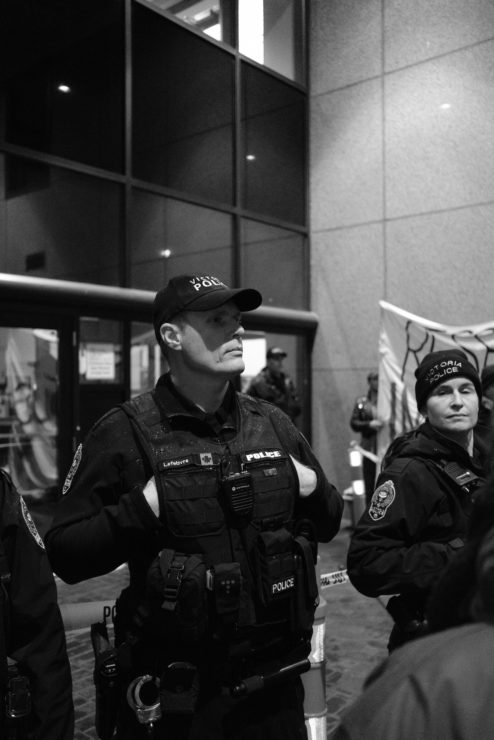Despite fewer protests, officers worked more overtime hours

In the first few months of 2020, the Victoria Police Department has spent $183 000 on officers’ overtime wages during public rallies, marches, demonstrations and protests.
There were 40 protests in 2019 that VicPD were involved with and 34 from Jan. 1 to March 5 2020. Despite more protests and greater numbers of people out protesting in 2019, such as at the 20 000-person climate strike, VicPD has spent $100 000 more in 2020 so far.
“Whenever possible, on-duty resources are used to provide public safety,” VicPD said in a press release. “However, if the size and complexity of an event requires it, additional officers will be deployed on overtime to ensure public safety.”
In 2020, police were present at a number of actions involving the Indigenous Youth for Wet’suwet’en, including two where people from the group were arrested.
VicPD was unable to respond to the Martlet’s request for comment, and therefore could not specify the overtime amounts associated with these specific dates at the time of writing. Their offices are experiencing additional pressure at the moment associated with COVID-19.
Climate Strike Victoria and Our Earth Our Future held numerous rallies in 2019, including the Global Climate Strike on Sep. 27. It was one of the biggest rallies the city has ever seen, and four or five police officers were involved in crowd control.
One of the organizers, Emma-Jane Burian, estimated that they had over 20 000 people in front of the B.C. Legislature that day. Numerous Indigenous leaders and NDP leader Jagmeet Singh were in attendance.
“While I understand that police play a role in the safety of protests, I believe that VicPD needs to work more with the community and address racism and discrimination within the police force,” Burian said. “I know many people who did not feel safe after the protests that have happened.”
Numerous actions in 2020 took place at the B.C. Legislature, as the Indigenous Youth for Wet’suwet’en demanded the RCMP and Coastal GasLink (CGL) pipeline be removed from Wet’suwet’en territory. The Wet’suwet’en do not approve of the pipeline, prompting demonstrations across Canada.
Those in the demonstrations at the B.C. Legislature buildings amassed about 1 000 people at one time, at maximum. On two specific nights where Indigenous Youth for Wet’suwet’en members were arrested there was a heavy police presence.
On the night of Jan 21 and into the early hours of Jan 22, 13 people were detained for mischief after holding space at the B.C. Ministry of Energy, Mines and Petroleum Resources offices. Afterwards, complaints were filed against the VicPD.
Some of the same youth arrested that night were involved in additional actions at the legislature throughout February, culminating on March 5. After being invited inside by the Minister of Indigenous Relations and Reconciliation, Scott Fraser, five of the Indigenous Youth declined to leave a legislative conference room and were arrested at around 9 p.m. Just before 2 a.m., police officers moved the youth into waiting vehicles.
The Indigenous Youth for Wet’suwet’en did not respond to the Martlet’s request for comment. They have been invited by the hereditary chiefs to go onto Wet’suwet’en land, where the CGL pipeline is being constructed. On April 5, they were confronted by police while they took photos on a road near the construction site. The police issued them an injunction before following them off the road.
CGL continues to work on the territory without Wet’suwet’en consent. The Provincial Health Officer, Bonnie Henry, has issued orders that the workers must comply with to prevent the spread of COVID-19.
Due to COVID-19, all large gatherings have been prohibited to limit the spread of the virus. Henry has recommended people limit their social circle to their immediate family and one to two others, and maintain a distance of two metres between people.







